Whether we acknowledge it or not, a human life remains a lot about discovering the unknown. Just look at the way we function, and you’ll see how we dedicate ourselves to learning under every possible situation. By doing so, human beings create a reality where they can become better on a consistent basis, and when that’s your primary backdrop, you are always going to come across some really interesting by-products. Talk about the by-products we have seen so far, each one has actually played a vital role in our overall development. However, if we have to pick the most impactful of them all, we cannot pick anything other than technology. Technology pulls away from the pack rather meritoriously, as it didn’t just elevate us beyond all limits, but it also reimagined our very identity from a holistic standpoint. In case that wasn’t enough, the creation notably made sure of the same within each area throughout the spectrum, including our global healthcare sector. While the idea of a healthcare-technology linkup barely sounded realistic at the start, the dynamics will change big time, and once they do, we’ll start to look at this sector in a whole new light. In fact, even after the world’s perception of healthcare was successfully altered, the sector continued to progress without a hiccup. It would go on to produce many concepts along the way, with the latest one now set to emerge from Fitbit’s camp.
Google-owned, Fitbit has officially secured FDA’s approval for an all-new feature, which allows you to monitor passive heath rhythm. The feature is designed to assess and alert the user, if they are showing any signs of atrial fibrillation, a type of irregular heartbeat that puts people at a higher risk for stroke. According to certain reports, Fitbit has been working on this tech for a few years now. The company conducted an extensive study around it in 2020, enrolling more than 455,699 participants. Following the study, it was found that the feature stood corrected in 98% of the cases. While Fitbit already has a similar tool in its ECG App, it requires users to get their reading manually. The new feature, however, solves this conundrum by constantly running in the background.
“With today’s FDA clearance of our PPG-based algorithm, Fitbit now provides two ways to detect AFib. Fitbit’s ECG app, which takes a spot-check approach, allows you to proactively screen yourself for possible AFib and record an ECG trace that you can then review with a healthcare provider. Additionally, the new PPG-based algorithm allows for long-term heart rhythm assessment that helps identify asymptomatic AFib that could otherwise go undetected.” Google said in a statement.
Google is yet to reveal a specific date for the launch, but going by the indications, it should be out soon.



















